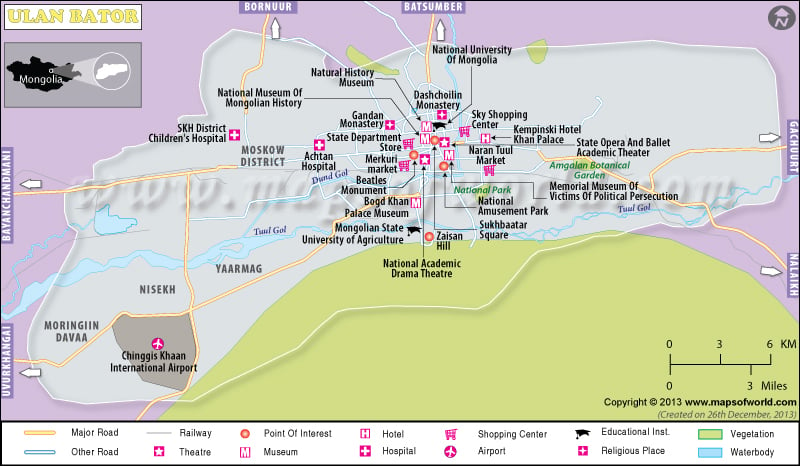About city :
Ulaanbaatar is the capital of Mongolia located in Central Asia. It is the largest city of the country. It is located in the valley of the River Tuul. The city was founded in 1639 as a moving Buddhist monastery. It was settled permanently in 1778 at the junction of the Rivers Tuul and Selbe after 28 relocations. It officially became the capital of independent Mongolia in 1924. The name Ulaanbaatar comes from Mongolian Ulaganbagatur meaning “red hero”. The city covers an area of 4704 sq km and had a population of 1,278,000 in 2012.
Geography :
The city of Ulaanbaatar is located at an elevation of 1351 m. It is within the area of the Arctic Ocean basin. It is surrounded by several mountains like Bogd Khan, Byanzurkh, Songino Khairkhan and Chingeltei Khairkhan. Great mountain passes called Khojuult, Tsagduul, etc are located to the east of the city.
Several streams of the Tuul River flows through and around the city. The largest of them is the Terelj River. The east flowing streams which feed the Tuul River are Elstiin Gol, Khulin Gol and Nalaikh while the west flowing streams are Tolgoit and Ikh Naran.
Streams also feed the Selbe River. Belkhiin, Shadivlan, Jigjid and Zaisan are the streams that flow into the Selbe River. Bust Lake and several springs are other sources of water.
The city has a cold semi-arid climate bordering on the subarctic that is somewhat influenced by the monsoons. The winters are long, cold and harsh while summers are short and warm. Rivers freeze in winter. The city remains covered with snow for the most parts of November to March. July is the warmest month. There is very little wind in Ulaanbaatar.
How to reach (transport) :
The city employs the Chinggis Khaan international airport located 18 km away to the south of the city. Flights arrive from destinations like Berlin, Moscow, Beijing, Seoul and Tokyo. Domestic flights are also available. The city is also accessible by train though the journeys are long. It is connected to the Trans-Siberian Railway through Naushki and the Chinese Railway system through Ereen. Within the city, buses and taxis are used. It is not advisable to travel by car because most of the roads connecting Ulaanbaatar with other destinations within Mongolia are not paved.
When to visit :
The best time to visit Ulaanbaatar is from May to September. The peak period is in July.
Fairs and Festivals :
Though the city of Ulaanbaatar may appear rather drab at first. A little exploration will soon help you to reach out to a kind-hearted, hospitable people. Almost half of the population has been urbanized while the other half generally consists of members of pastoral nomadic tribes who come to work here if their livestock are killed off by a harsh winter.
Several fairs and festivals are held in Ulaanbaatar. Some are traditional while others have been promoted to attract tourists. They are:
- The biggest and most popular festival of Ulaanbaatar is Naadam which is celebrated from 11th to 13th July at the National Sports Stadium. The festival is older than the city. Several games are held. Wrestling, horse racing and archery are the traditional contests of Naadam. An elaborate introduction ceremony with music, dance and athletic ceremony are watched widely throughout Mongolia.
- The Ice Ankle Bone Shooting and Bow Shooting festival is held on 16th February on the Tuul River.
- The eagle hunting festival is celebrated on 5th March since 1999. Kazakh games, culture, traditions, handicrafts and products may be enjoyed.
- The Deeltei Mongol Festival is a recent addition to the calendar of events in the city and is held on 13th July at the Sukhbaatar Square. A fair is held where you can enjoy Mongolian music concert, ankle bone shooting competition, a circus performance and dress and handicrafts of Mongolia.
Points of interest (places to visit) :
There are 14 important historical and cultural sites in Ulaanbaatar. The Sukhbaatar Square at the center of the city is the main square where all the parades are organized. The square is marked by one of the largest statues of Chinggis Khan in the country.
- The Gandantegchinlen Monastery is located to the north of the city and is the center of Mongolian Buddhism. The most notable feature here is the gigantic Janreisig statue build with 19 tons of copper gilded with gold and precious stones from all over the country.
- Choijin Lama Monastery contains an impressive collection of art of Buddhism in Mongolia and the famous coral mask of Begtse. Examples of artifacts and sculptures made by famous Mongolian sculptor Zananazar are also kept here.
- The Bogd Khan museum was originally a palace. It has huge collection of costumes, furniture, scroll paintings, wood carvings, religious objects, decorative arts, thangka paintings, etc.
- The Zanzabar Museum of Fine Arts contains a fine collection of Buddhist art.
Accommodation :
A good place to stay is essential for a successful holiday and Ulaanbaatar does not disappoint in this regard. Kempinski Hotel Khan Palace, Sunjin Grand Hotel, Ramada, Blue Sky hotel and tower and the Chinggis Khan hotel are the most luxurious and expensive hotels in the city. Budget accommodations are available at Puma Imperial hotel, Kaiser, New West, and New World Plaza, etc. Good quality hostels like Town Yard Hostel, Nassan, Lotus, Ujin, Danista Nomads, and Sunpath Mongolia, etc are the cheapest options.

